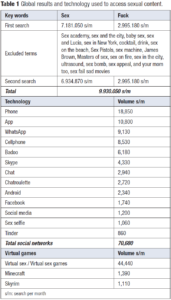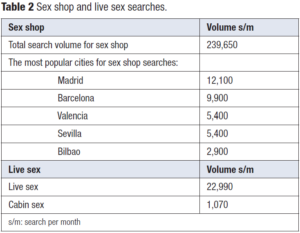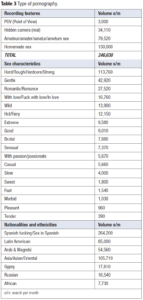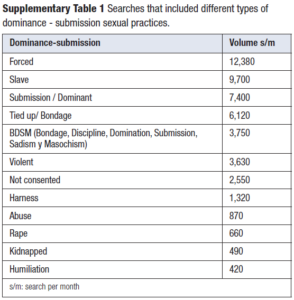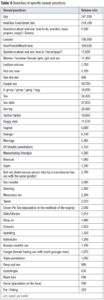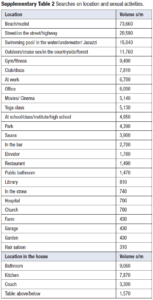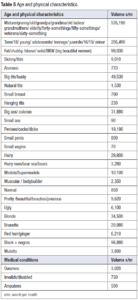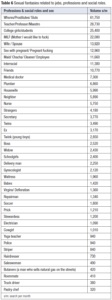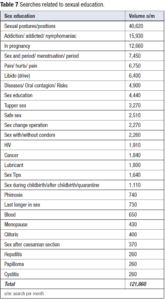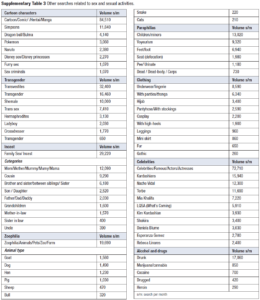Introduction
Over the last decade, studies on sexuality have reported a crisis of desire and a decrease in sexual activity, particularly among young individuals [1]. This can be attributed to the immediacy of experiences that the contemporary generation lives through, which is largely influenced by the prevalence of the internet. The cyberspace has played a significant role in the hypersexualization of society, leading to a paradigm shift in sexuality. The internet was first introduced in Spain in 1984 in an exclusive academic context, but over the years, it has become an essential element of the daily life for most citizens, thanks to advances in technology and the accessibility of the internet without time or space limits [2].
One of the advantages of the internet is the privacy it offers. Anonymity is crucial, particularly in cases of internet searches on topics that are often considered social taboos, such as sexuality. The big search engines have created a database with infinite potential by storing information related to the characteristics of the searches carried out by users. These data are an excellent source of information on human thoughts and behaviours. Until recently, research on human sexuality was limited to surveys, which oversimplified the matter and neglected the multiplicity of thought, in addition of being strongly influenced by the social desirability bias.
Seth Stephens Davidowitz, in his book "Everybody Lies," notes that "The power of Google data is that people tell their search engine things they might not tell anyone else [3].” (3) This aspect of data opens the door to an unexplored universe of knowledge regarding the most guarded desires of a human being.
The present study aimed to investigate the sexual concerns most asked to Google by residents of Spain, to shed light on the prevalence of explicit sexual content searches and the types of sexual content requested by internet users. Additionally, these data offer insight into the current sexual interests and behaviours of the Spanish population.
Methods
This study analyzes Google searches related to the keywords "SEX" or "FUCK" carried out in Spain over the past 12 months.
Sample
According to the INE (National Statistics Institute) the total population of Spain is 45,862,500, with immigrants making up 12.78% of the population (5,947,106 in total) [4]. Of the total population between the ages of 16 and 74, 85% regularly use the internet, with 35.8 million of them accessing it via their mobile phones [5]. Google is the most popular search engine used by 92.31% of consumers in Spain, both on desktop computers and mobile devices [6].
The sample for this study consisted of Google searches that included the keywords "SEX" or "FUCK" carried out in Spain, excluding searches associated with terms unrelated to sexuality, such as "sex academy," "Lucia and sex," or "sex on fire." The exclusion criteria and the classification of the results in subgroups were based on consensus between authors and external referrals in case of discordance.
Instruments and methods
To collect data, we used the Keyword Magic Tool from the Semrush platform (Semrush Holdings Inc. Boston, Massachusetts, USA), which provided a quantitative assessment of searches for keywords and phrases associated with the investigated keywords. The data was expressed in volumes, which represent the total number of searches made through the search engines, expressed as a monthly average volume over the previous 12-month period (abbreviated as searches/month or s/m). Repeated searches for the same term by the same user were not counted as a new search. Throughout this procedure the study provides a systematic analysis of search terms related to sexuality in Spain, based on broad concordance with the keywords "SEX" or "FUCK," and their conjugations or phrases in any order.
Results
The volume of searches associated with the keywords “SEX” or “FUCK” carried out through Google in the territory of Spain reaches almost 10 million per month (Table 1). Of them, around 70,000 searches per month are requests for sexual experiences through social networks (Phone, App, WhatsApp, Badoo, Skype, FaceBook, Tinder and others). In addition, about 50,000 people per month seek virtual sexual experiences through video games.
Sex shopping
Internet users in Spain search 240,000 times per month for shops dedicated to the sale of sexual, which is 10 times more than live sex events. The most popular Spanish cities associated with searches for sex shops or directly with the investigated keywords are: Madrid followed by Barcelona and Valencia (Table 2).
Sex practices
The most requested style of pornography is amateur or home recording summing up to 246,630 s/m. The residents of Spain mostly want to see hard, wild, extreme, brutal and fast sex (almost 150,000 s/m). Although not far behind there is the demand for soft, romantic, loving, hot, good, sensual, passionate, slow, sweet, pleasant and tender sex with almost 130,000 s/m, as well as casual sex (5,660 s/m) or kinky sex (1,030 s/m).
In Spain, the most requested pornography is with the representation of Spaniards or in the Spanish language (more than 3 million searches per year). The next most popular ethnic group is Latinos with 65,000 s/m, followed by Arabs (54,560 s/m). Table 3 illustrates the most popular pornography types.
The most popularly searched sexual practices are: gay sex (347,930 s/m), anal sex (218,790 s/m), lesbian sex (136,900 s/m) and oral sex (109,820 s/m). Within the realm of sexual education, oral sex garners the most queries regarding technique, with a total of 11,690 searches per month. Notably, there is a significant gender disparity, with oral sex in women submitting three times as many inquiries as oral sex in men.
Anal sex with the type of inquiries: how to do, practice, have, prepare, enjoy - adds up to more than 9,000 s/m. The request for sex in different configurations of more than 2 people (group, threesome, double penetration, sex roulette, triple penetration) is only slightly higher than the demand for sex images of couples (couple, marriage, missionary) – 74,140 s/m vs 57,470 s/m. Any form of sexual activities with inflatable dolls or sex toys are also (57,430 s/m). This could explain the previously mentioned high interest in businesses such as Sex Shops. It should be noted that adding all types of dominance - submission practices, this activity ranks fifth in popularity among the most requested sexual practices on Internet (49,290 s/m) (Supplementary Table 1). Table 4 illustrates searches of specific sexual practices
The most sought-after locations for sexual activity are beach (73,660 s/m), street (20,590 s/m), pool (15,040 s/m) and outdoors (11,760 s/m) (Supplementary Table 2). On the other hand, the most popular spaces for sexual activity in a household are the bathroom (9,060 s/m), the kitchen (7,870 s/m) and the sofa (3,300 s/m). The demand for content that reflects sexual activity in public (“caught having sex”, “sex in public” or “in secret”) results are around 130,000 s/m, leaving apart sexual activity in public transportation such as buses, taxis, subways, trains, or planes that accumulate more than 35,000 s/m (Supplementary Table 2).
Physical and age characteristics
(Table 5)
Contrary to the glorification of youth and thin bodies in popular media, in the privacy of their homes, residents of Spain search for pornography with mature actors twice as often as with young actors (535,190 vs 205,490 s/m), and following this trend, sexually explicit content with plus-sized actresses is requested 10 times more frequently than with slim actresses (99,030 vs 9,780 s/m). Regarding other requested body characteristics, black and mixed-race skin tones, as well as large breasts, buttocks, and penises are in high demand. There is a significant demand for unshaved bodies and no request for shaved ones. Attractive faces are only slightly more popular than unattractive faces (9,620 vs 6,100 s/m). Blonde hair has 70% more searches than brown hair and 6 times more than red hair. There is also a small demand for sexually explicit content featuring individuals with medical conditions such as dwarfs, disabled persons, or amputees (4,250 s/m).
Sexual fantasies
Prostitutes alone have the bigger demand on the internet (61,750 s/m) than sexual fantasies regarding teachers, students, and college students combined (54,130 s/m). When it comes to sexual fantasies starring women, MILFs (mothers of your friends that you would like to fuck) are the most popular category after prostitutes (22,080 s/m) (Table 6). Third in the female category are wives (13,920 s/m), followed by pregnant women, maids, neighbours, nurses, and secretaries. For men, teachers (in Spanish language clearly defined as masculine gender) have the highest search volume with 28,730 s/m. Doctors and plumbers follow with four times less demand, while delivery men have 10 times fewer requests.
Sex education
Questions that include the keywords “Sex” or “Fuck”, mostly inquiring about how to make, have or practice sex, account for 98,950 s/m and are depicted in Table 7. If we add the latter figure to more than 120,000 s/m related to education and sexual health, all together they account for 2.2% of all Google searches associated with the investigated keywords. The greatest interest of Internet users is focused on the aforementioned practice of oral sex and anal sex followed by queries about sexual positions (40,620 s/m), sex addiction (15,930 s/m), and sexual relations during pregnancy (12,660 s/m) or during menstruation (7,450 s/m). Other searches related to different aspects of sexual activity or preferences are given in Supplementary Table 3. These searches include:
Cartoon
Interest in comic or cartoon-type pornography outnumbers the demand for sexually explicit images of oral sex with 110,349 s/m, and to say the least, sexual fantasies about Disney princesses (2,270 s/m) surpasses that of sexual fantasies about waitresses or stewardesses.
Transgender
With the current claim of transgender states, this activity could be classified as the 5th most popular sexual practice or 1st sexual fantasy with almost 74,000 s/m.
Incest
The study found that there is a significant demand for incest pornography, with an average of 29,220 s/m. The most popular subcategory within this genre is "mother," with 12,090 s/m. When adding up all of the found incest categories, the practice would rank in popularity with 65,290 s/m as high as transgender pornography and twice as high as group sex.
Zoophilia and other paraphilias
According to the results, zoophilia (26,220 s/m) is 3 times less popular than incest, but at the same time twice as popular as pedophilia (13,020 s/m). Although the last result may be underestimated, since the Incest category “Son/daughter”, and other categories such as: “sex with high school girls”, “sex with schoolgirls”, “sex with 15” or “sex with 16” could be considered part of the pedophilia section.
Clothing
Clothing category could be considered to be included in sexual fetishisms and a part of paraphilias subgroup. The most requested pornography is with people dressed in lingerie (8,590 s/m), panties or thongs (6,340 s/m), followed by women wearing hijabs (3,400 s/m).
Celebrities
Interest in celebrities’ sex-life accounts for more than 70,000 s/m. By far the most popular are the Kardashians (15,940 s/m), then the actors from the Spanish series La Que Se Avecina (5,910 s/m), and in third place Shakira (3,400 s/m). Regarding pornographic actors, the most famous are: Nacho Vidal (12,300 s/m), Torbe (11,690 s/m) and Daniela Blume (3,030 s/m).
Abuse of substances and sex
The abuse substances per excellence in the context of pornography turned out to be alcohol (17,060 s/m), followed by far by marijuana (850 s/m), cocaine (700 s/m) or heroin (290 s/m).
Discussion
The result of this research reports that in the territory of Spain around 10 million searches related to sex are carried out per month. A number that is surely underestimated, given the biggest limitation of this study, which could be not including all the searches performed using other search engines or searches not involving search engines.
Considering the population of Spain and the use of the Internet, it could be concluded that 1 out of 4 residents of Spain clarifies their concerns related to sex through Google. To better understand the magnitude of this demand, the question "how to get there" is asked to Google only 1.5 million times a month. Nowadays, the internet is the primary channel for the distribution of pornography, offering a greater variety of images to a wider audience at a lower cost [7]. There is no consensus on the prevalence of online pornography use, but a 2006 American study found that 47% of adults visited explicit websites and 36% downloaded pornography in the last month [8]. Studies show that adolescent exposure to explicit sexual content varies greatly by country, ranging between 7% and 98% [9]. Additionally, there is a lack of statistics on the types of explicit sexual content requested by internet users.
According to the results of the present study, more than 97% of all searches that include the keywords “SEX” or “FUCK” made in Spain are requests for explicit sexual content.
The present study reveals the close relationship between sex and technology, with many searches for sexual experiences made through social networks and video games. This highlights the importance of technology in shaping sexual behaviour and desires. Moreover, our data show that the demand for sexual accessories is much higher than that for live sex events. This reflects the increasing acceptance and normalization of sex toys and other sexual aids in society [10].
Another finding of our study was that the most popular style of pornography was amateur or home recordings, with residents of Spain seeking hard, wild, extreme, brutal, and fast sex. This suggests a preference for more intense sexual experiences, and an interest in exploring different forms of sexuality. Internet pornography has been considered as either motivating sexual aggression and abuse or as helping as a safety valve. This dichotomy is a critical issue in health, media, and social politics. According to observational studies on pornography, soft-pornography and non-violent pornography has been regarded as innocuous, whereas non-violent hard-core pornography and violent pornography may increase the risk of aggression [11].
It is interesting to note that the most popular ethnic group in pornography is Spaniards or those who speak Spanish, followed by Latinos and Arabs, results that correlate positively with the immigration rates in Spain. Similar findings were observed in a qualitative survey regarding pornography-viewing habits of urban adolescents in Boston [12], and this reflects preference as well as content that is more familiar and culturally relevant to the audience.
In our web analysis, the most popular sexual practices included gay sex, anal sex, lesbian sex, and oral sex. Oral sex garners a lot of queries regarding technique, and there is a significant gender disparity, with oral sex in women being searched for three times as much as in men. The superior female interest in watching and learning oral sex has already been described by different authors [12,13].
One not-at-all surprisingly data reported in our study is that the physical and age characteristics that are most sought in pornography users in Spain aren’t ideal bodies. Mature actors and plus-sized actresses were those more demanded, suggesting a preference for more realistic depictions of sexuality, and a rejection of mainstream beauty standards. This finding is similar to that observed by Kvalem among Norwegian Gay and Bisexual Men [14]. Men with less ideal bodies were chosen to watch pornographic actors with body shapes similar to their own and in this way, self-perceived attractiveness viewing Internet pornography made a unique contribution to higher self-esteem as a sexual partner.
Although our study is purely descriptive, to categorize as paraphilia, some of the demands for explicit sexual content is a challenging task, given the ambiguity surrounding the definition of paraphilia and the range of behaviors that may be considered part of it. Paraphilia encompasses sexual practices that go beyond those considered acceptable by the cultural model within which they are practiced, and as such, may be judged aberrational. If we include categories such as incest, zoophilia, dominance-submission games, clothing, and medical conditions under the umbrella of paraphilias, approximately 2.8% of all searches, or 275,570 s/m, can be classified as such. Interestingly, Hill et al. [11] highlight that the phenomenon of "sexual addiction" (or paraphilia - related disorder) is particularly relevant in relation to the abuse of internet pornography and strongly recommended preventive measures to protect possible victims as well as treatment strategies for offenders. On the other hand, erotic target identity inversions are poorly studied paraphilias that involve sexual arousal by the idea or fantasy of being the object of one's sexual desires. Data by Brown et al. [15] support the concept of paraphilic dimension in non-clinical samples as in our study and the possible role of gender-related psychological factors.
Overall, the present study provides valuable insights into the sexual interests and desires of residents of Spain. It highlights the important role that technology plays in shaping sexual behavior, and the need for greater understanding of the cultural and social factors that influence sexual preferences. The findings of this study can inform efforts to promote sexual health and education and contribute to a more open and informed discussion of sexuality in society.
Strengths of this study include the large, non-clinical sample of men and women. The acquisition of data by an Internet search engine may be unrepresentative since extracted data is based exclusively on the key words used, although the Internet has the advantage of allowing recruitment from stigmatized or unusual groups. In addition, the anonymous nature of the internet searches allows us to obtain an actual picture of the real demands of users. The cross-sectional nature limits our conclusions, as no causal inferences can be made and unfortunately, we cannot draw any conclusions regarding the impact of the internet on real life sexual behavior because this was not part of the design of the study Other limitations include: the loss of data associated with searches carried out through search engines other than Google, searches that skip the step of a search engine, and knowing that it is possible to analyse the presented data classifying it by sex, age and autonomous community of the users, in addition expanding the range of investigated keywords and the period of time for data collection, we can improve our knowledge about human sexuality and its modern tendencies.
Conclusion
Big Data will surely revolutionize the way the human sciences study human beings. Using our methodology, the present study is pioneer in the field of sexuality in relation to the Spanish territory. The analysis of the data carried out here is a mere attempt to assess the sexuality of the residents of Spain using information free from social desirability bias.
The influence of Internet on human sexuality is still to be evaluated. Perhaps by analyzing the data from the last decade or two, relating it to the results of field studies, we could more clearly appreciate the consequences of the abundance of audiovisual material with explicit sexual content on human sexuality.
Finally, there is still a lot of available data to analyze and interpret and considering the fast advancing of technology, in the next future the big data and the artificial intelligence hold the key to our understanding of human sexuality.
